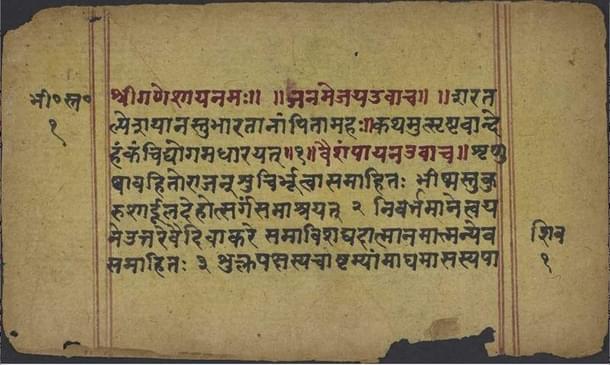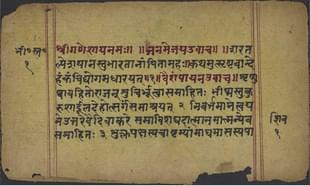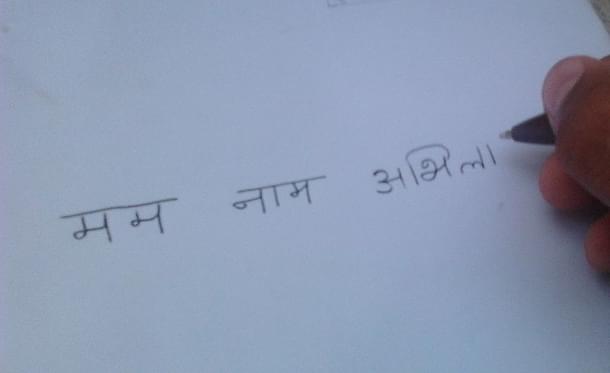Culture
The Audacity of Sanskrit
Shashikant Joshi
Nov 26, 2014, 03:40 PM | Updated Feb 10, 2016, 05:06 PM IST
Save & read from anywhere!
Bookmark stories for easy access on any device or the Swarajya app.


Why we need to study the mother of all languages.
Lately, Sanskrit has been in the news for all the wrong reasons.
“Smriti Irani defends Sanskrit replacing German as third language in Kendriya Vidyalayas”, “Third language change in CBSE schools upsets parents”, “Merkel raises German language issue with Modi at Brisbane”, “Basic Sanskrit likely for Std VIII KV students”, “Dumping German to hurt KV students”
These are some of the headlines by a certain media house, better known for keeping abreast of Bollywood Divas. To add to this, some ministers even mentioned words like plastic surgery, and Heisenberg’s Uncertainty Principle in the same sentence as Sanskrit, India or Hinduism—all of which are incidentally synonymous to political pundits and laymen alike, albeit for different reasons.

Another headline related to languages that came to my attention was on November 9th: “Teaching them young: Tots learn to say ‘ni hao’ to Mandarin”. Apparently in Mumbai, over 200 kids, with around 90 of them between 3 and 6 years, are learning Mandarin. One parent said “These lessons are a gift to my daughter for her future”, and Mandarin is the “language of the world’s fastest growing economy”. This made me think much more than what media is discussing regarding languages.
A recap of the reasons floating on both sides. One side says that foreign languages must be taught because the world is a global economy; it helps find more lucrative jobs abroad; Sanskrit is a dead language; Sanskrit is a communal reminder; etc. On the other side, Sanskrit is the mother of all languages; it is the best language for Computer Science and Artificial Intelligence; Sanskrit has all of modern scientific knowledge in it—plastic surgery, aeroplanes, atomic bombs… you name it!
A quick note on the plastic surgery issue, which has been ridiculed a bit. It is well known that Sushruta did rhinoplasty, and his instruments were sharp enough to split a hair lengthwise. That is tool-making technological advancement besides just medicinal feats. Even if we think that it was all theoretical, 1794 CE has hard historical evidence.
“In the 18th century, during the Third Anglo–Mysore War (1789–1792) of colonial annexation, by the British against Tipu Sultan, the East India Company surgeons Thomas Cruso and James Findlay witnessed Indian rhinoplasty procedures at the British Residency in Poona! In the English-language Madras Gazette, the surgeons published photographs of the rhinoplasty procedure and its nasal reconstruction outcomes; later, in the October 1794 issue of the Gentleman’s Magazine of London, the doctors Cruso and Findlay published an illustrated report describing a forehead pedicle-flap rhinoplasty that was a technical variant of the free-flap graft technique that Sushruta had described some twenty-three centuries earlier.” (History of Rhinoplasty) .
An Italian army surgeon ten years later did the surgery purely by reading the text and seeing the pictures, and was successful. This was the start of plastic surgery in modern Western world. Note that this was not just academic knowledge; it was in practice even after 2,000 years; this one apparently done by a cobbler as a side job!
Anyway, I digress. Going by media reports alone, one can never know what the full truth is, so let us explore the topic with that disclaimer.
First of all, “Kapil Sibal-led UPA ministry surreptitiously swapped Sanskrit out and swapped German into the curriculum in 2011”, so read one article. If it is true, it was wrong. And if the recent reversal has happened mid-session that is also wrong. Or is it just that the decision has been made now, but it will take effect next session? If German was part of the three-language syllabus (mandatory rather than optional) instead of Sanskrit, that is also wrong. Why should a foreign language with no connect to the culture be mandatory?
Let us consider some more points that have been missing from the debate.
Who will benefit?
Learning Chinese or German is not going to benefit India, it will benefit China and Germany and potentially the individual in economic ways, if he or she is smart in other subjects as well. So what should be the reason to offer it in government schools, that too mandatorily? The learning is not for strategic national issues, like what the US is doing since 9/11 in learning foreign languages to better understand, and hence manipulate and control, other cultures. In India, it is being proposed for better job opportunities abroad!

Language carries its culture with it. English books will have Shakespeare, Wordsworth and others whom I have not read. I am yet to finish many great Indian authors. Chinese books will have works of their own thinkers. But sadly, even in Hindi, translated Russian stories are included in the CBSE Class X syllabus. Where did Premchand go? When I was learning Sanskrit in my schooldays, we had excerpts from Upanishad, though simpler ones like ‘satyam vada | dharmam chara | bhootyai na pramaditavyam’ etc.
That exposed the mind to some world class thoughts delivered at the earliest existing recordings of human kind, which even if doesn’t make sense in your schooldays, would be available for contemplation at a later stage of life. Today’s CBSE Sanskrit textbooks have ‘This is a television. It shows pictures from far away.’ While it is great to show that Sanskrit can be used to communicate modern ideas, the richness of its original ideas should not be sidelined.
Learn other languages while learning ours as well.
When a German learns English or French, or a Chinese learns Korean, do they do it by ignoring or ridiculing their own language? Have you seen a headline like, ‘Germany dumps Latin in favor of Malayalam’ ‘Chinese favour Spanish over Mandarin’? No one neglects their own stuff to learn something new. You master your own language, then go ahead and master others. Experts say that learning should first happen only in the mother tongue, so that the child develops mastery over one language. There are many articles (Example 1, Example 2) available on the net on this subject.
Forget about Sanskrit, modern students and parents alike are neglecting their own mother tongues. Bollywood stars who earn crores from Hindi cinema read dialogues written in Roman script. What shame and what disrespect to one’s own profession! One can’t even learn the script of the language that makes them stars? Ads abound in Roman script using Hindi. Learning of foreign languages should not be at the stake of Indian languages. We already learn one foreign language mandatorily—English.
Will learning a language make the difference? Did Germany make progress by learning Swahili or China by learning Finnish? If you want to succeed like Germany or China, then adopt their work ethics, their systems of justice, governance, transparency or whatever suits your situation. When someone says “Learn Sanskrit for its wisdom”, a counterargument is “Even if we suppose that there is some useful wisdom in Sanskrit, why not translate it all in all the modern languages and be done with it. Why learn Sanskrit?”
So even if there is some great scientific content in German or Chinese, I am sure it is all available in English at least for the entire college-level curriculum for mere mortals. Post-doc? You are on your own! So there is no need to learn foreign languages just for its content. Then, the only reason remaining is to connect culturally, socially and economically to the people. Then why not learn our own languages with the same sincerity and passion, before we embark on other languages? Connect to our own culture, before connecting to others’?
Is Sanskrit less of a language linguistically? There is enough material out there for anyone who cares and is able to read, about the undisputed superior nature of the way Sanskrit grammar, and hence the language, developed. There is nothing over-patriotic about this claim. International linguists agree on this. The entire field of modern linguistics owes its origin to the study of Indology in the last few centuries. The only Spelling Bee contest in Indian languages, thanks to Sanskrit’s genes, is Canyou hear properly?, since there is no guess work from sound to letter.
The concept of forming conjugates, samyukta akshara is due to a deep linguistic principle that one sound should have one letter/character. In the last few years, the government of India has decimated Devanagri script in its attempts to simplify it. Instead of lifting the students’ standard, they chose to lower the standard of the language.

But Sanskrit is the language of oppression and oppressors. There is also a posse of bright motivated people that will tell you that Sanskrit is the reminder and remainder of Brahminical oppression beyond compare, of the caste system and what not. So is English the reminder and remainder of British colonialism! But consider for a moment: for centuries, the whole world was going crazy trying to get to India; to do commerce with the only powerhouse of world economy till 1857! You don’t build empires just on spirituality and religion. You need practical wisdom, knowledge, science; of course the policy can be guided by spirituality.
And you don’t need to concoct spiritual eclectic wisdom to oppress people; the West did so with simple sword and gun! So if Sanskrit should be shunned because some ‘priestly class’ [sic] misused their power while speaking in Sanskrit, then please don’t forget that Hitler spoke German while doing what he did, and Communism and suspension of liberty happened while the Premier spoke Mandarin, and the South and Central Americas were butchered while the Cross was held as witness, and the Middle East was bloodied while Koran was used as a guide.
If one finds some lines of some scripture to be incorrect or unjust or corrupted, one can simply go further back in time to find the purer truth, since society was not as corrupted then as it is today. It is like the Ganga—at Howrah it is a toxic pit, but as you go towards the source, to Allahabad, Haridwar, Rishikesh, Gangotri, it keeps getting purer and purer.
Is Sanskrit an artificial language? This is another misconception among partially aware people. It is said that Panini invented the language in about 500 BCE, or at least invented its grammar, or froze it into rigid rules. Panini didn’t invent the language or the grammar. He gave a way of describing the entire language of his time in precise, concise formulae (sutra), and not prescribing what the language should be. The majority of Vedic vocabulary can be easily understood even today.
Vedic compositions are the oldest surviving human utterances (words, not pictures). This means that this social group of Vedic times developed a simple thing like language into the most systematic, logical and computer-ish human invention, naturally! And even kids spoke this language at that time. There was no one to oppress. This is a feat one must try to comprehend properly. In 500 BCE, when societies were fighting to survive, here is one man who undertakes a project of analyzing linguistics, does a perfect job that has not yet been matched by computer grammarians. And they haven’t fully utilized all of Panini’s gyaan yet.
What is it about Sanskrit that is well-suited for computers? Many internet Hindus thump their chests at this, without knowing deeply the reasons and meaning of this statement. But that is what happens with masses everywhere. Since some parts of this have been covered elsewhere, I will give a single example. Simplistically put, modern computer language grammars are defined as a bunch of definitions (like axioms of Maths) and a bunch of generative rules. For example, in English, a story is a bunch of paragraphs; paragraph is a bunch of sentences; sentence is a bunch of phrases, words, letters etc. There are 26 letters. A sentence must have a subject, verb and optionally an object. You get the idea.
Simplistically, Panini gives basic definitions, and then goes on with sutras of the basic format: “A becomes B if C is true”. To understand the power, take just one sutra: iko yaNachi (Panini 6.1.77) ((ik + ach = yaN, i.e. ik become yaN when ach follows). It says in just three syllables the sandhi rule: “when i, u, Ri (of rishi), lRi (all called ik) are followed by any other vowel (all called ach) then i becomes y, u becomes w, Ri becomes r, lRi becomes l (all called yaN)”. Now you know why they say ‘The vowels are a, e, i, o, u and sometimes y’, because y come from i + a! But since Sanskrit was a living language at his time, his rules couldn’t cover some known ‘aberrations’ (to his formulated rules) already in use. For these, he uses exception rules. For example, we may say “1. All birds fly”. “2. Except emu, ostrich, kiwi, dodo and a dead duck.”
Imagine someone who has even partially mastered Panini by Class XII, how easy the complier design course will be in third year Computer Science! And what new algorithms he or she may discover at a younger age?
When my high school-going daughter asked: “What is the point of learning calculus or trigonometry which I will probably never use?” I said, “If nothing else, then learn from mathematics its way of expressing concisely, precisely and logically. If you even pick just that and never actually use rest of it, you have gained a lot.” Same goes for Sanskrit. A proper study of it, even preliminary, gives you new ways of thinking that are unique to the language. Later, you encounter ideas that are unique to the subcontinent.
To conclude, surely not all will find esoteric stuff useful, like discussing finer points of grammar, even if it is of C++, Java or .NET. They will be merely happy to get a job in Germany. But that should not mean that these topics should lose their place from academia, and pursuits of knowledge. Is there anything in Plato that we don’t know now? Then why study it anymore? Is there anything that Aryabhatt found in mathematics that we don’t know today? Probably a few of his coded messages may still be out there undiscovered!
Shashikant Joshi is the author of Attitude Shift: Sanskrit Maxims for Life and Leadership and runs the popular Facebook page PracticalSanskrit. He did his BTech in Computer Science from IIT Kharagpur and MS from the University of Minnesota.





